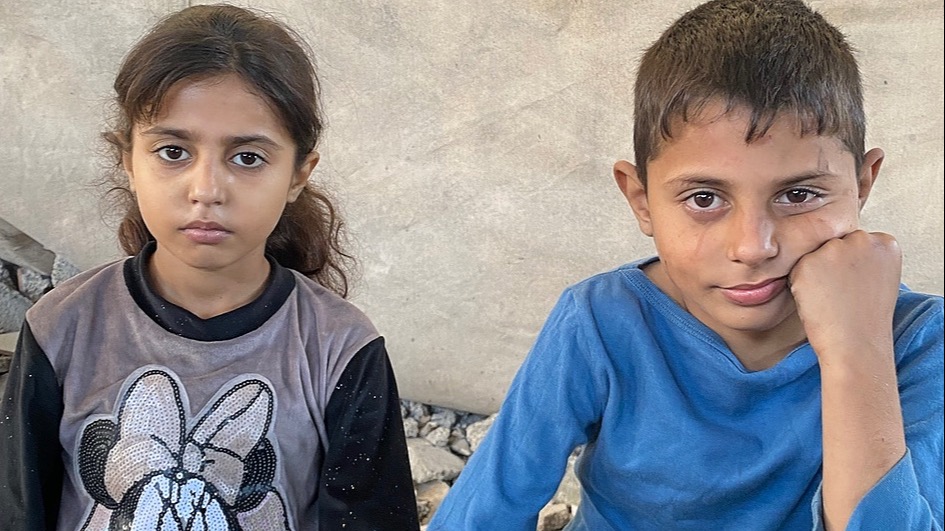🇵🇸 Urgent humanitarian appeal
I'm going to sleep now, maybe there will be donations tonight. Thank you to everyone who lent a helping hand. ❤️❤️🙏🙏✊🇵🇸🇵🇸
🔗 https://gofund.me/69c5653aa
📢 Please repost to amplify.
@mommunism.bsky.social
#FreePalestine #Gaza #HumanitarianAid #Repost
🇵🇸 Urgent humanitarian appeal
I'm going to sleep now, maybe there will be donations tonight. Thank you to everyone who lent a helping hand. ❤️❤️🙏🙏✊🇵🇸🇵🇸
🔗 https://gofund.me/69c5653aa
📢 Please repost to amplify.
@mommunism.bsky.social
#FreePalestine #Gaza #HumanitarianAid #Repost
My children are orphans; the war took their father, their home, and their sense of safety.
Their eyes carry questions bigger than their age, and their tears come from hunger and fear.
I hold them every night, hiding my pain behind a broken smile.
I have nothing but prayers, and they have nothing but hope.
Please do not ignore their suffering—your help could save them. 💔
https://chuffed.org/project/sirin
#WidowFromGaza
#OrphanedChildren
#SaveGazaChildren
#HumanitarianAid
#EmergencyRelief
#FoodAndMedicine
My children are orphans; the war took their father, their home, and their sense of safety.
Their eyes carry questions bigger than their age, and their tears come from hunger and fear.
I hold them every night, hiding my pain behind a broken smile.
I have nothing but prayers, and they have nothing but hope.
Please do not ignore their suffering—your help could save them. 💔
https://chuffed.org/project/sirin
#WidowFromGaza
#OrphanedChildren
#SaveGazaChildren
#HumanitarianAid
#EmergencyRelief
#FoodAndMedicine
⚠️ Fourth day without donations! ⚠️
💔 Only $150 left to pay this month’s rent
🏠 My children have no warmth or safety ❄️😭
🙏 Any donation, no matter how small, or even sharing this post, could save our lives today!
#freepalestine
#humanitarianaid
#charity
#palestine
@fabio
@aral
https://chuffed.org/project/120774-urgent-help-for-imans-family-in-gaza
⚠️ Fourth day without donations! ⚠️
💔 Only $150 left to pay this month’s rent
🏠 My children have no warmth or safety ❄️😭
🙏 Any donation, no matter how small, or even sharing this post, could save our lives today!
#freepalestine
#humanitarianaid
#charity
#palestine
@fabio
@aral
https://chuffed.org/project/120774-urgent-help-for-imans-family-in-gaza
What pain is this — my daughter wakes crying from cold and suffering while I have nothing to give her… ❄️😢💔
Have mercy on Aryam — she is sick and needs milk, diapers, and medicine 🍼🧸💊🙏
What stops you from helping us? Just $5 from each person could make a real difference and help save us 🤲💞
Please don’t leave Gaza and its children alone 🕊️🤍
https://chuffed.org/project/omshamm
#Gaza #SaveGaza #HelpChildren #SaveAryam #GazaChildren #HumanitarianAid #StandWithGaza #ChildRights #EmergencyAid #ProtectInnocents
What pain is this — my daughter wakes crying from cold and suffering while I have nothing to give her… ❄️😢💔
Have mercy on Aryam — she is sick and needs milk, diapers, and medicine 🍼🧸💊🙏
What stops you from helping us? Just $5 from each person could make a real difference and help save us 🤲💞
Please don’t leave Gaza and its children alone 🕊️🤍
https://chuffed.org/project/omshamm
#Gaza #SaveGaza #HelpChildren #SaveAryam #GazaChildren #HumanitarianAid #StandWithGaza #ChildRights #EmergencyAid #ProtectInnocents
I beg you… stand by us!
My children are not asking for luxury or toys, only warmth, medicine, and food 💔🥺
Any support, whether by donating or sharing, could be the reason they survive.
Donation link�
chuffed.org/project/omsham
#Palestine #Gaza #HumanitarianAid #SaveLives #HelpChildren #UrgentAppeal #Friends #WarmthMedicineFood #EveryDollarCounts #HopeForChildren
I beg you… stand by us!
My children are not asking for luxury or toys, only warmth, medicine, and food 💔🥺
Any support, whether by donating or sharing, could be the reason they survive.
Donation link�
chuffed.org/project/omsham
#Palestine #Gaza #HumanitarianAid #SaveLives #HelpChildren #UrgentAppeal #Friends #WarmthMedicineFood #EveryDollarCounts #HopeForChildren
You have always supported us in our hardest times. Your donations are still our lifeline. 🙏
Because of you, we can provide essentials like medical care, food, education, and clothing.
We are holding on, but we still need your help. Please don’t hold back — even a small donation makes a real difference. 🤍
#SupportGaza #Donate #HumanitarianAid
https://gofund.me/2790a0f8
You have always supported us in our hardest times. Your donations are still our lifeline. 🙏
Because of you, we can provide essentials like medical care, food, education, and clothing.
We are holding on, but we still need your help. Please don’t hold back — even a small donation makes a real difference. 🤍
#SupportGaza #Donate #HumanitarianAid
https://gofund.me/2790a0f8
I still live here…
despite all the destruction.
Not because it’s my home,
but because it’s the only place
that hasn’t been taken from me yet.
This is all the safety I have left.🥺💔
#gaza_verified
#SaveGaza
#HelpGaza
#DonateForGaza
#GazaRelief
#GazaEmergency
#StandWithGaza
#HumanitarianAid
#WarVictims
#InnocentLives
#GazaNeedsHelp
#ReliefForGaza
#humanityfirst
#gofundme
@aral
@joynewacc
@gaza_verified_accounts
@fabio @gaza_verified_accounts
@byroncclark
Yesterday, I went through a sudden health setback, and it has been a difficult time both physically and emotionally.
Unfortunately, I haven’t received any donations for the past two days.
Your support even if it’s small can make a real difference in my life and give me the strength to keep going.
#freepalestine
#humanitarianaid
#charity
@fabio
@aral
https://chuffed.org/project/120774-urgent-help-for-imans-family-in-gaza
I extend my deepest gratitude to everyone who empathizes with our pain.
Your small donation of just $3 means so much to us during these difficult times and gives us hope.
This link is the sole source of income for my three children. Please double your last donation if you can. With all my love.
#Participation
🇵🇸🫂👨👩👦👦👨👩👦👦
https://chuffed.org/project/154249-israas-hope-a-familys-fight-to-rebuild-after-war
#HelpMyChildren #DonateNow #ChildSupport #HumanitarianAid #ChildSupport
Hello friends
I still need your support and help in securing winter blankets for my family. We live in a tent. We have freezing from the cold. Please help me urgently.
I only received $70 out of $150
Please consider my matter.
#freepalestine
#humanitarianaid
@fabio
@simonbrooke
@TomSwirly
Hello friends
I still need your support and help in securing winter blankets for my family. We live in a tent. We have freezing from the cold. Please help me urgently.
I only received $70 out of $150
Please consider my matter.
#freepalestine
#humanitarianaid
@fabio
@simonbrooke
@TomSwirly
8 days without donation 🆘
please help @shathamohammed123 💜
https://www.gofundme.com/f/assist-walids-family-in-departing-from-gaza-for-treatment
RE: https://mastodon.world/@raphaellakay/115932257286603693
Walid and his siblings urgently need your help and support.
They are facing extremely difficult conditions and cannot survive without your kindness and solidarity.
Every small contribution can make a real difference in their lives.
Please stand with them and help bring hope back to their hearts.
#HelpWalid #SaveChildren #GazaChildren #HumanitarianAid #StandWithPalestine #UrgentHelp
8 days without donation 🆘
please help @shathamohammed123 💜
https://www.gofundme.com/f/assist-walids-family-in-departing-from-gaza-for-treatment
RE: https://mastodon.world/@raphaellakay/115932257286603693
Walid and his siblings urgently need your help and support.
They are facing extremely difficult conditions and cannot survive without your kindness and solidarity.
Every small contribution can make a real difference in their lives.
Please stand with them and help bring hope back to their hearts.
#HelpWalid #SaveChildren #GazaChildren #HumanitarianAid #StandWithPalestine #UrgentHelp







